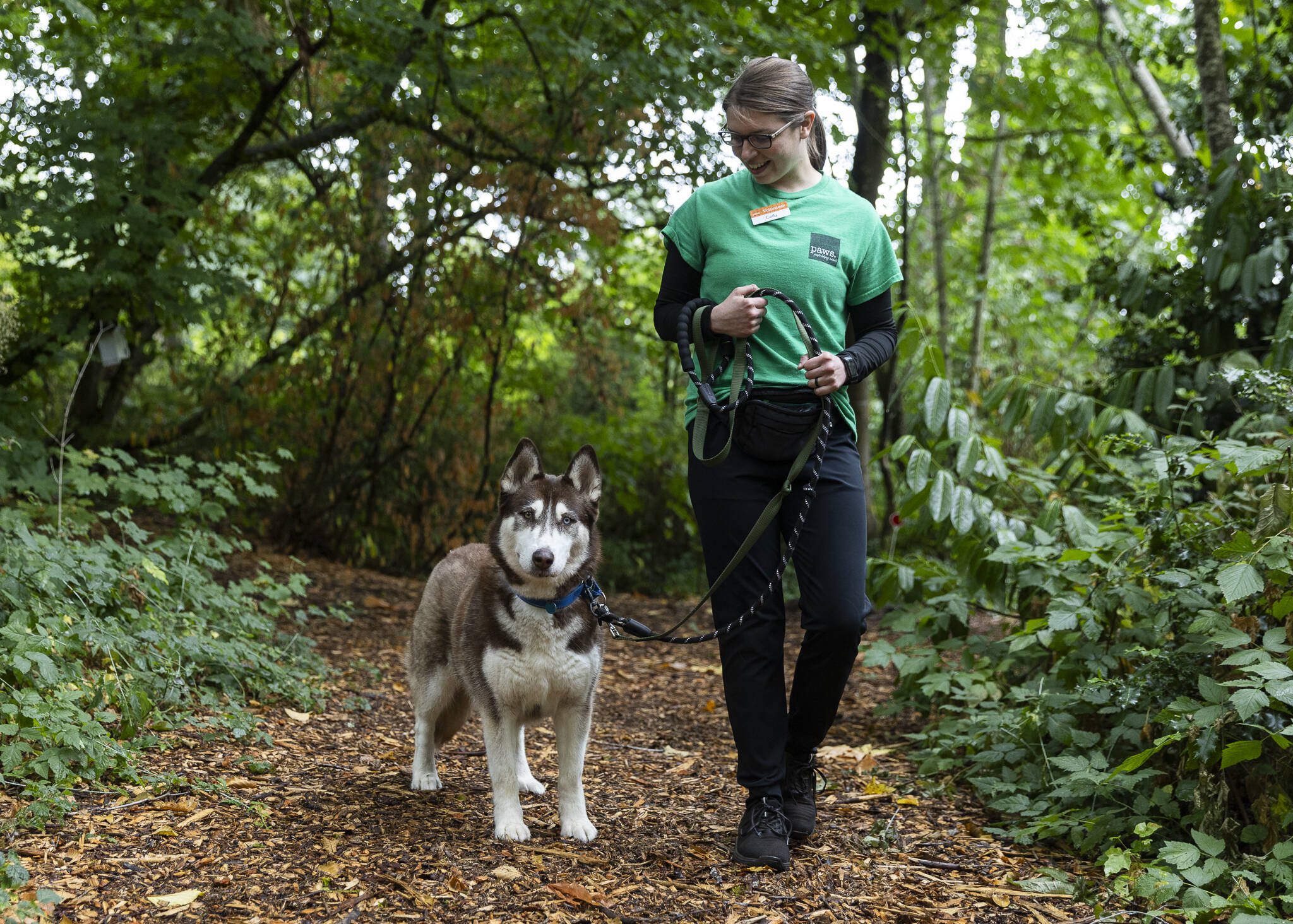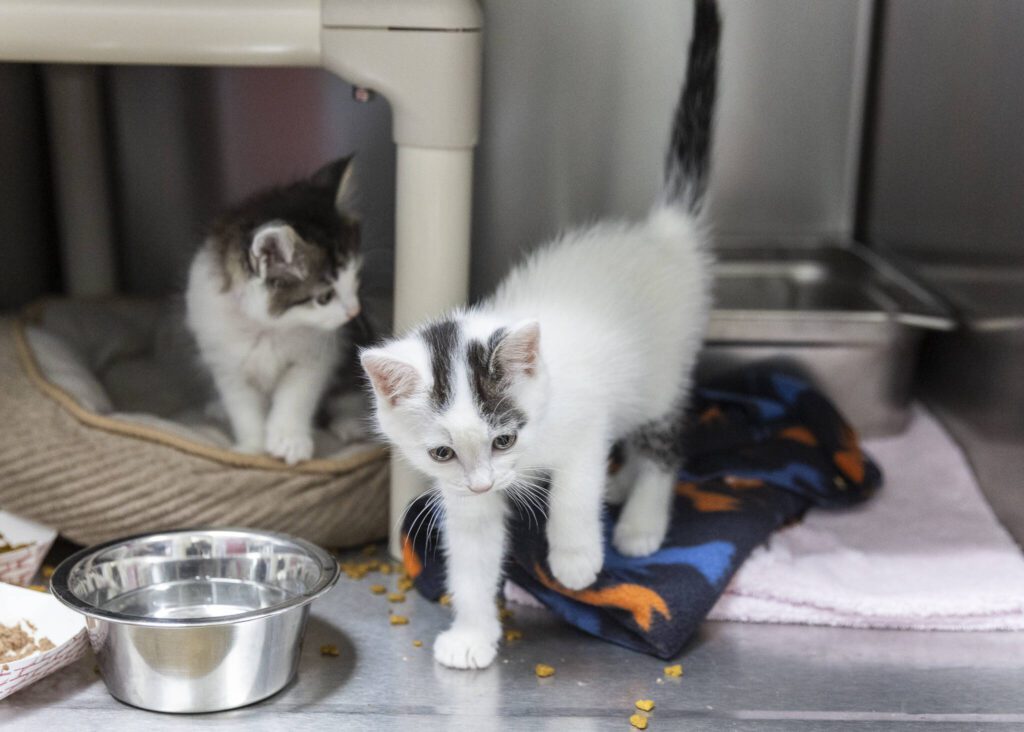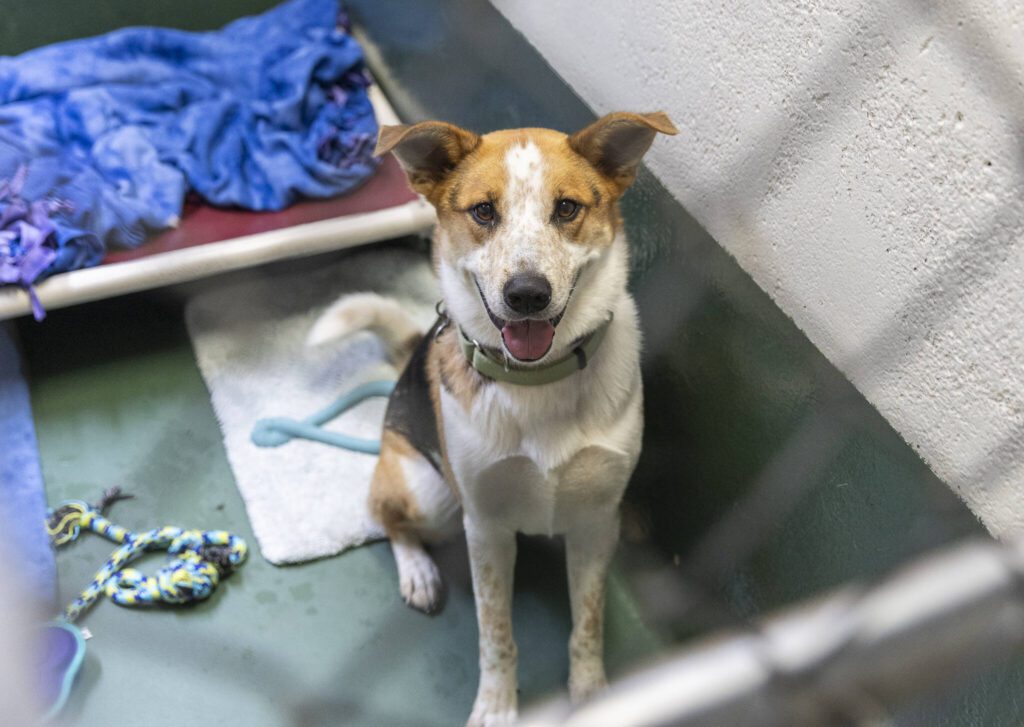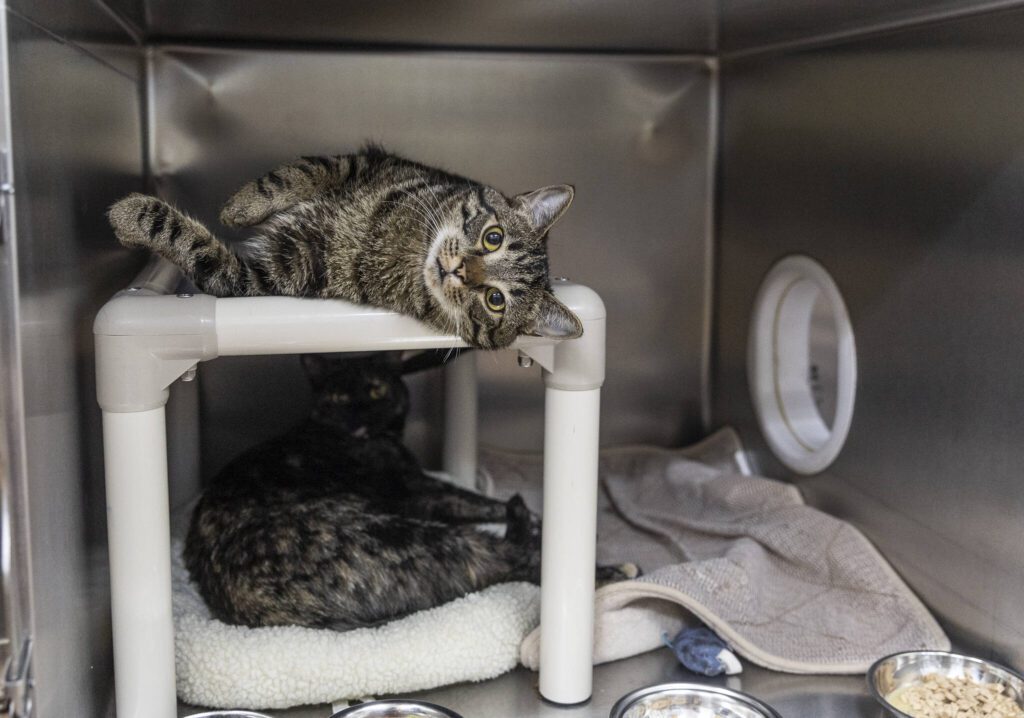LYNNWOOD — On Aug. 5, PAWS volunteers saw a person leaving a cardboard box near a dumpster on the animal shelter’s property.
“When the staff approached to gather more information, the individual declined to engage and quickly walked away,” said Andi Anderson, Senior Director of Philanthropy and Outreach at PAWS.
Inside the box were two kittens, estimated to be seven weeks old. The kittens were scanned for microchips and treated for fleas. Overall, they were in good health.
The PAWS team named them Aurora and Lottie.
Pet surrenders are up across the nation. Dog surrenders are 37% higher at the Lynnwood animal shelter compared to this time last year, Anderson said in an email.
“The ability to afford just basic vet care can be pretty daunting for some people,” said Rachel Bird, associate director at the PAWS Lynnwood Companion Animal Shelter, in an interview on Aug. 7. “Being able to afford just the basics for an animal, even just food, toys, things like that.”
Veterinary care costs in the U.S. have risen more than 60% since 2014, studies show. Dog food costs have increased by 45.5% since 2020.
In a January 2025 survey, 42% of pet owners said rising pet food prices caused significant challenges, and 39% said the same about the cost of veterinary services.
For many, these challenges have led to dogs and cats coming back to the shelters from which they were once adopted.
“We do see some animals coming in to us to be surrendered because people can’t afford the spay and neuter surgeries,” Bird said. “I know there’s definitely people out there who understand that they should do it, but they just can’t financially provide that for them.”
The NOAH Center in Stanwood has a pet return waitlist, Operations Director Sara Bradshaw said during an interview Aug. 11. If there is no space to put a surrender, the center can’t take them right away. “Space is at a premium,” she said.
“That is really hard for a lot of people to understand why they have to be on a waiting list,” Bradshaw said. “I cannot keep suites open just for dogs to come back.”
The NOAH Center partners with other shelters to take on extra dogs and cats. In the last five years, the number of shelter partners has increased from just over 70 to more than 100.
Over the last 18 months, Bradshaw noticed a particularly high number of pet surrenders due to housing insecurity and rising rent, she said.
Also, many apartment buildings have animal restrictions, Bird said. Some take only certain breeds and others allow no pets at all.
“If they have to move, are they going to be able to find a place they can afford that will allow animals?” Bird said. “Or they charge a pet rent or a pet deposit. That right there’s just another cost.”
Not all surrenders take place for financial reasons. Unfortunately, the COVID pandemic is still affecting whether some pets find their forever home.
During the pandemic, dog trainers were unable to enter homes, Bird said. Pets stayed home all day with their owners, who are now going back to work.
“So then your dog may exhibit some undesirable behaviors,” she said. “So we definitely saw an increase of dogs coming to the shelter who maybe just lacked a few basics.”
The dog and cat population boomed during COVID, Bradshaw said. Spay and neuters were not essential surgeries. Also, everyone was adopting, so “backyard breeders,” she said, were everywhere.
“There are more dogs and cats than there are adoptable homes,” Bradshaw said.
People’s willingness to take on difficult pets has also changed, Bird said. More people than ever are looking for a pet who can “just be good in the house,” she said.
“Times are hard. People are really looking for that emotional support that animals are so good at providing,” Bird said. “When you bring somebody home and you’re like, ‘Wow, they’re not house-trained. They chewed up my couch. They’re in the garbage. They’re chasing my cat.’ It’s stressful, and it is not providing that kind of relief that people are looking for.”
Bird sees at least one owner surrender every day because the animal was difficult to care for, she said.
“We see many people who want to do the right thing and they just can’t,” Bird said. “So many people, they love these animals, they care about these animals, but they’re struggling themselves and they have to prioritize.”
While a waitlist can make things difficult for The NOAH Center, sometimes it helps animals stay with their new owners, Bradshaw said. While they wait, sometimes people make it work.
However, there are plenty of surrenders that are still necessary, Bradshaw said.
“I’ve got a return coming in today,” she said. “She’s a victim of domestic violence, and there’s nowhere for her to take her dog, so she has to bring him back here.”
Bradshaw’s goal is to keep pets in their homes. The NOAH Center also encourages private rehoming. However, if a surrender is needed, Bradshaw is happy to make that work when space is available.
Bird hopes things will become more affordable, she said, or that more programs help people keep their animals. However, she does think the number of surrenders will continue to go up, she said.
“I think it’s important for people to know that we appreciate them. We understand times are hard,” Bird said. “We know that they love their animals and that they want to do right by them, and when our space and resources allow, we would like to help.”
Shannon Swinehart is a client services representative at the PAWS shelter. Sometimes a surrender is the only loving thing that an owner can do, she said.
“Unfortunately, it’s like their last act of care for the animal is to give it to somewhere that they can get the animal the help they need,” Swinehart said.
When a family comes in to surrender a pet, PAWS keeps a bin of stuffed animals to give to the children, she said.
“It’s a good distraction for them,” said Client Services Representative Ferrai Spence. “Their parents are talking about why they have to surrender, or the financial hardships that they’re going through.”
“It also gives them something to leave with when they’re leaving without their animal,” Swinehart added
To volunteer with PAWS visit paws.org/volunteer. For The NOAH Center, visit thenoahcenter.org/volunteer.
Taylor Scott Richmond: 425-339-3046; taylor.richmond@heraldnet.com; X:@BTayOkay
Talk to us
> Give us your news tips.
> Send us a letter to the editor.
> More Herald contact information.




























